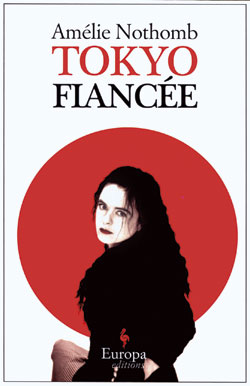World Books Review: Allons’y, Alonzo
Two French writers take on the notion of would-be writers on the run. Only one gets away with it.
Julien Parme By Florian Zeller Translated from the French by Christopher Moncrieff. Pushkin Press, 246 pages.
Tokyo Fiancee by Amélie Northomb Translated from the French by Alison Anderson. Europa Editions, 152 pages.
Reviewed by Tommy Wallach

French author Florian Zeller — his novel deals with a would-be writer on the run.
I wasn’t planning to review these two books together, as I happened to read them one after the other only by coincidence. However, they have so much in common—and their differences perfectly point out why one is successful and the other is not—that I felt reviewing them at the same time would only help to clarify my opinions about them.
First, the similarities. Both authors are French. Both arrived on the literary scene at the age of 25. Northombe’s first novel was “Hygiène de l’assassin”; in Zeller’s case, it was actually his third novel, “La Fascination Du Pire”, that earned him the attention of the literati. Both novels are about would-be writers (in Northombe’s case, herself). Both novels are about the notion of escape, of what it means when we choose to run. Both novels are sparing in their use of description, and eschew a serious plot in order to develop a character.
The characters thus developed are where these two novels begin to distinguish themselves. The protagonist of Zeller’s book is Julien Parme, a 14 year-old boy with a criminal streak and ludicrous literary aspirations. His narration evokes a Holden Caulfield raised on a strict diet of Hemingway: “I was afraid I’d get his voicemail, but luckily it rang. But it just kept on ringing. And in the end I got his voicemail. Shit. I hung up. He couldn’t have heard his phone because of the music. I tried a second time. He still didn’t answer.” Parme fascinates mostly due to his acrobatic evasion of self-awareness; he is the kind of kid who rails against bullies even while stealing cash from a half-blind old woman.
The story takes place over a little less than two days. Julien steals his stepfather’s cash card and embarks on a brief adventure. In spite of the boisterous tone with which the book opens (First line—notice the missing comma: “At the risk of surprising you I’d like to tell you about the incredible thing that happened to me last year.”), very little happens on Julien’s odyssey. He goes to a party. He runs into a teacher outside of the classroom. He feels up a girl. He almost runs away to Rome. His decision not to flee comes on the second to last page; the book ends with the end of the rebellion.
“Tokyo Fiancee” finishes on a similar but entirely opposite note. The protagonist, twenty-three year old Amélie Nothomb (Nothomb calls the book fiction, but that seems more like a legal precaution than anything else), has spent the novel being romanced by a Japanese man while living in Tokyo. Though she agrees to marry him, she eventually decides her freedom is more important, so jumps on a plane back to her homeland of Belgium, never telling him she’s not planning on coming back.
Does that make Nothomb sound a bit unlikeable? You don’t know the half of it. Though we’re never made aware just how much of the story is fictionalized, “Tokyo Fiancee” references its author’s novels, her heritage (Belgian writer who writes in French and was born in Japan), and numerous details of her biography. So when Nothomb’s “character” waxes poetic about her beauty, brilliance, and athletic ability, it’s difficult to hold back the incredulity. The cover of the book doesn’t help: Nothomb framed by the rising sun of a Japanese flag, gazing at us with the gamine semi-seriousness of a deservedly more famous French Amélie.
All this would be forgivable if the book were a pleasure to read, but this is not the case. In fact, the first two-thirds of “Tokyo Fiancee” might just be among the worst published writing I’ve encountered. Here are two short bits that follow one after another on the same page:
#1: “The next morning, the punctuality of the Mercedes was equaled only by its white sheen.”
#2: “Rinri had changed. His profile as a driver was no longer as immobile and impassive. His silence deepened, with an interesting awkwardness.”
Describing gradations of writerly error can be difficult. For example, to explain why Thomas Wolfe is a better writer than Tom Wolfe, it is necessary to go into the minutiae of style, which most people couldn’t care less about. Explaining why Nothombe is terrible, however, poses no problem at all. Consider the first passage. This is a car that has already been described as “magnificently white” “too-white” and “whiter than ever”. But punctuality cannot be compared to whiteness, nor can a car be punctual, nor is a white sheen the same as white paint.
In the second passage, we have “profile as a driver” standing in for “face.” And while that face is described as more emotive than usual, the character’s “silence” is said to have “deepened”. This is both a cliché and an inanity. How does a silence deepen? And what makes that awkward? And what makes that awkwardness interesting? And how is he less impassive but more silent?

In her latest novel, Amélie Nothomb sings a song of herself.
Amélie Nothomb takes pains to portray herself as a free-spirited, deeply emotional woman. Julien Parme, on the other hand, initially comes across as a brutal, selfish child. So it’s ironic that Nothomb eventually betrays herself as a brat, while Zeller reveals Parme to be a sage. “So what if flight is not very honorable?” Nothombe pontificates at the end of her book. “It’s still better than allowing yourself to be caught. The only dishonor is that of not being free.” But Parme, at fourteen, returns from his adventure to face his mother, having recognized the cowardice of flight: “I took a deep breath to drive away my fears. And I got into the lift, hoping very much that she’d forgive me. That she’d forgive me for being who I am, and not someone else.”
Tagged: Amélie-Northomb, Books, Featured, Florian-Zeller, Julien-Parme, Tokyo-Fiancee, Tommy-Wallach



